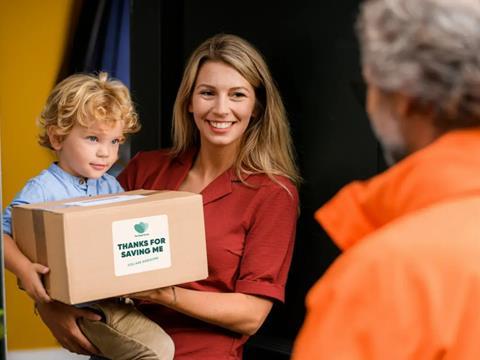
Unilever is collaborating with Too Good to Go to provide home delivery for in-date food that would otherwise go to waste, hoping to make good use of money and still-edible products and improve consumers’ access to products approaching their sell-by date.
Too Good to Go uses an app to bring food suppliers selling leftover, but not yet out of date, food to the attention of consumers. This produce can then be reserved and collected from nearby restaurants, bakeries, and supermarkets to prevent it from being thrown away – a system said to have already spared 16 million meals from unnecessary disposal.
Now the company’s partnership with Unilever is set to allow consumers to order a box of products from brands such as Knorr, Unox, Calvé, and Conimex, which will then be brought directly to their doorstep. Although the products provided are only Unilever brands at present, the companies are encouraging others to join the initiative.
With WRAP’s suggestion that up to a third of food produced across the world is thrown away, much of it still thought to be safe to eat, Unilever hopes that the scheme will contribute towards its own goal of halving food waste by 2025.
“We have halved our food waste from production to supermarket shelves in the Netherlands in the past two years,” says Debora van der Zee-Denekamp, general manager, Unilever Nutrition Northern Europe. “Our work with Too Good to Go is part of that and this new opportunity to deliver products that can no longer be sold through regular channels directly to people’s homes is really exciting.”
The collaboration follows a previous partnership between the companies in 2020, in which they conducted a pilot in Rotterdam that offered 1,000 boxes containing products that were anywhere between a week to several months past their ‘best before’ dates. Its reported success led to the project scaling up, and to brands such as Knorr and Hellmann’s implementing a ‘look, smell, taste – before you waste’ label into their packaging.
Several supermarket chains cracked down on ‘best before’ dates in the latter half of last year; Waitrose removed them from almost 500 of its products, while Asda replaced them with a display code for employees to gauge the product’s freshness on nearly 250 of its fruit and vegetables.
Such changes may help to tackle the 8.8 million tonnes of food waste thought to be created by incorrect date marking, as recalled by Andrew Manly, communications director at AIPIA.
Asda also collaborated with Whywaste to implement a new app-based data solution that records expiry dates to simplify the mark-down process and reduce wasted food.














No comments yet